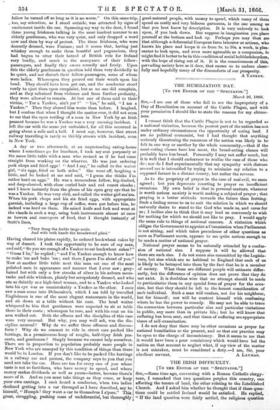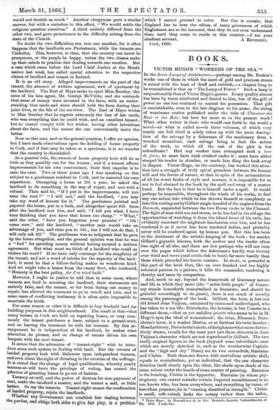THE IRISH DIFFICULTY. - [To THE EDITOR OF THE "
SPECTATOR."] SIR,—Some time ago, conversing with a Roman Catholic clergy- man, I remarked that two questions perplex this country, one affecting the tenure of land, the other relating to the Established Church. And I asked him whether he thought that if these ques- tions could be settled Ireland would be satisfied. He replied, " If the land question were fairly settled, the religious question
would not trouble us much." Another clergyman gave a similar answer, but with a variation to this effect, " We would settle the religious question ourselves." A third entirely differed from the other two, and gave prominence to the difficulty arising from the state of the Church.
No doubt the two difficulties run into one another, for it often happens that the landlords are Protestants, while the tenants are Catholics. This, however, is clear, that the country can never be prosperous, or the people be happy, unless the two classes make up their minds to practise fair dealing towards one another. But a case which came before the Lord Chief Justice at the Meath assizes last week, has called special attention to the respective claims of landlord and tenant in Ireland.
It is an old story. Alleged improvements on the part of the tenant, the absence of written agreement, writ of ejectment by the landlord. The Earl of Mayo seeks to eject Miss Bentley, the niece of his late agent, Mr. George McVittie, and she contends that sums of money were invested in the farm, with an under- standing that uncle and niece should hold the farm during their joint lives, or the life of the survivor. The Earl of Mayo writes to Miss Bentley that he regrets extremely the loss of her uncle, who was everything that he could wish, and an excellent tenant ; but he cannot comply with her wishes, having other intentions about the farm, and the sooner she can conveniently move the better.
Now on this case, and on the general question, I offer no opinion, but I have made observations upon the holding of house property in Cork, and if that may be taken as a specimen, it is no wonder that the country is dissatisfied.
As a general rule, the owners of house property here will do as little as they possibly can for the houses ; and if a tenant effects improvements for his own convenience, their first impulse is to raise the rent. Two or three years ago I was speaking on this subject to a gentleman resident in Cork, and he narrated his own experience. Occupying a house at 30/. a year, he asked the landlord to do something in the way of repair, and met with a refusal. Then said he, "If I put in the improvements, will you raise the rent ?" " I will not," said the landlord, " you may take my word of honour for it." The gentleihan painted and papered the house, put in a bath, and altogether spent 80/. Soon after the landlord met him, and said, "I tell you what, I have been thinking that you have that house too cheap." " What," said the other, " have you forgotten your promise ?" " Oh ! come now," said the landlord, "another man would take an advantage of you, and raise you to 501.; but I will not do that, I will only ask 421." The gentleman was so indignant that he gave up the house altogether, and the general opinion was that he was a " fool " for spending money without having secured a written agreement. But what must we think of a landlord who could so violate his word? If we have only contempt for the simplicity of the tenant, and not a word of rebuke for the rapacity of the land- lord, it must be that a fellow-feeling makes us wondrous kind. And we might take a lesson from the canny Scot, who confessed, ‘i Honesty is the best policy, for I've tried baith."
However, I ought in justice to add that in some cases, where tenants are loud in accusing the landlord, their statements are entirely false, and the tenant, so far from laying out money in repair, has allowed the tenement to go to wreck and ruin, and in some cases of conflicting testimony it is often quite impossible to ascertain the truth.
For some reason or other it is difficult to buy freehold land for building purposes in this neighbourhood. The result is this—that many houses in Cork are held on repairing leases, or very com- monly the tenant purchases a lease, subject to a ground-rent, and on leaving the tenement he sells his interest. By this ar- rangement he is independent of his landlord, he makes what alteration he pleases, and on change of tenure drives his own bargain with the next tenant.
It seems that the advocates of " tenant-right " wish to intro- duce some such system in dealing with laud. But the owners of landed property look with disfavour upon independent tenants, and even claim the right of dictating in the exercise of the suffrage. It is stated that the change of legal qualification, whereby yearly tenants-at-will have the privilege of voting, has caused the pfactice of granting leases to go out of fashion. Tenancy-at-will, and the power of distress for non-payment of rent, make the landlord a master, and the tenant a serf, or little better. So say the tenants. Tenant-right means the confiscation of landed property, rejoin the landlords.
Whether any Government can establish fair dealing between the parties, and oblige both aides to give fair play, is a problem
which I cannot pretend to solve. But this is certain, that England has to bear the odium of many grievances of which . Englishmen are so far innocent, that they do not even understand them until they come to reside in this country.—I am your obedient servant, A RESIDENT. Corp, 1866.































 Previous page
Previous page